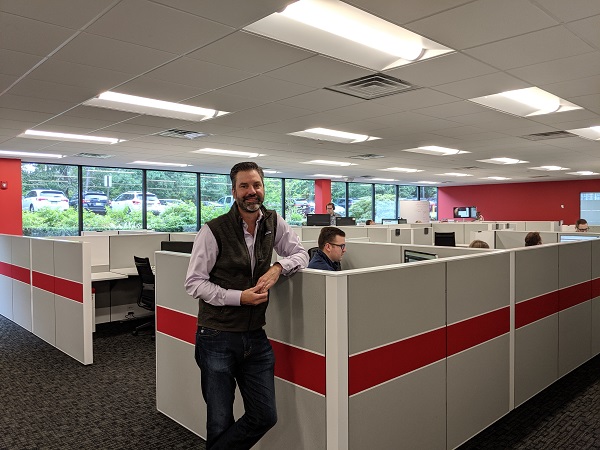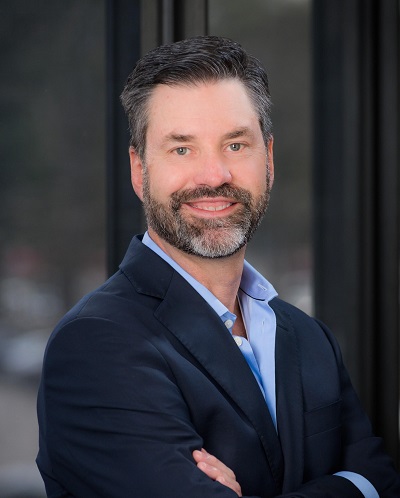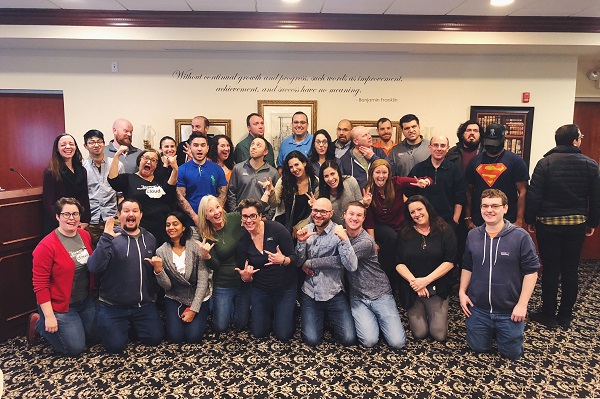Interview With Chris Sullens of CentralReach, A Company Transforming Autism Services Delivery
When Chris Sullens took over the helm at CentralReach a little over a year ago, it had a single employee in New Jersey. Him.
Now there are about 70 employees in New Jersey and the company has moved out of its first space, at Bell Works, to new offices in Matawan. That’s how quickly CentralReach is growing. And much of that growth is taking place in New Jersey.
The company, which is headquartered in Florida, has 200 employees today, with 85 in its Pompano Beach office, 30 remote employees, plus another 15 in Kansas City as the result of an acquisition. Recently, the company came in at number 903 on Inc. magazine’s annual list of the 5,000 fastest-growing private companies in America.
CentralReach provides a platform of applied behavior analysis (ABA) software and services for behavior analysts who work with kids on the autism spectrum. The software helps them manage all the things they need to do in the office, including scheduling patients, taking in new clients, tracking client progress and processing claims with insurance companies.
What really differentiates CentralReach from general purpose business computing platforms is its emphasis on supporting and facilitating the ABA workflow. “As registered behavior technicians are meeting with their clients with autism, they are collecting all the data through a mobile app and then charting all that data,” Sullens told us. “They are using all that information to figure out if the children are progressing in the areas they are focusing on, whether its learning how to brush their teeth, make eye contact or any of a myriad of other life skills that the learners need.”
Sullens joined CentralReach as its CEO in July 2018, after he left WorkWave (Holmdel), which had been acquired by IFS (Chicago) in October 2017. Under Sullens’ leadership, WorkWave had grown rapidly and became a market leader in its category.
NJTechWeekly.com asked Sullens a series of questions about CentralReach, including where it is going, what he hopes to accomplish and why he took on this particular challenge.
Why did you decide to take on the role as CEO at CentralReach?
“First of all, it’s a very rewarding and energizing area in which to work because it provides an opportunity to work with leading technology while also truly making a difference, not just with our customers but with the industry as a whole. The vast amount of data collected on the platform allows our users to make better decisions about what’s working and what’s not for each individual learner, which leads to much better outcomes vs. paper and pen or other competing systems.
Also, it was an early market leader that was already growing very quickly, with many opportunities to make improvements that would extend that leadership position and accelerate its growth. I felt there were several things we could do to improve the product, add talent and introduce process and systems that would support our planned growth. The founders had built a strong company and there was a good opportunity for continued growth.
The equity backers of the company were also a factor. I got to know Insight Venture Partners [New York] while I was at WorkWave, and there was a degree of familiarity. An important piece of this is that the investors and the board really need to be 100 percent aligned with the CEO in terms of how they want to grow the business. Insight is very focused on investing with the management team to build strong companies with great cultures that grow quickly, which is obviously something that is very important to me.
Also, the existing team at CentralReach was a major influence in my decision. The founders had cultivated a culture within the business that closely aligned with the culture I built at WorkWave, and the culture I am comfortable in and feel strongly about. The CentralReach team had great people who were focused on the customer and passionate about what they do, and they wanted to work together to make the business better.
How does CentralReach differentiate itself?
While there are a lot of similarities in our software to software used in other medical markets, there are many nuances in the vertical that are important to the practitioners we serve. The main reason we are different is that we provide a full end-to-end solution that allows our customers to fully manage the back-office tasks of their practice and collect all the data they need during each session in a way that is seamless and fully integrated. It is something that none of our competitors truly provide today.
Additionally, the regulatory and compliance aspects of this industry are quite different from other medical specialties. Our clients need to go where the learners are, be it at their home, at a school, at their place of work or in a clinic, so scheduling complexity is high. It goes beyond just getting the right behavior technician to the right location at the right time, and includes ensuring that the service is coded properly and that the learner is authorized to receive services by the insurance company. This is an area that we lead on today and have plans to enhance greatly in the near future.
ABA is a very data- and process-driven discipline, so robust capabilities in the data collection area are also very important. There is a significant amount of data collection, data charting and data analysis required. Behavior analysts must respond to these data inputs and make changes in the programming, so they can accelerate outcomes for programming that is working or adjust the programming if the current approach isn’t working with the learner. The data collection and data analysis we offer is fairly unique in this industry, and is another reason our growth is accelerating in this space.
What kind of operations take place in New Jersey?
In New Jersey we have the bulk of our leadership team, our product and engineering teams, as well as finance, talent, sales and marketing. Many of these functions, outside of engineering, were relatively new to the company and most of our engineers were remote when I started, so that made it easier to build much of those functions here in New Jersey. The primary divisions housed in our Florida office are the client operations (customer service, customer success, implementation, onboarding and training) and our managed billing service, BillMax, which helps a subset of our customers process claims with insurance through our software, so they can focus their attention on working with the kids.
Besides growing organically, CentralReach made some acquisitions this past year. Tell us about them.
Absolutely, but to give a little context I need to share a little more about the markets we serve. CentralReach serves both large companies as well as small, and we have more than 900 customers that use our application, including a large percentage of both the largest providers and the smallest small and medium-sized businesses in the industry.
After being here for a year and spending a lot of time with customers, I realized that the needs of those two segments were diverging at a rapid pace. There is a lot of investment coming into the largest players in our industry, and it’s bringing with it an increased level of sophistication and needs that impact the functionality that applications like CentralReach must provide. The smaller side of the market, while growing rapidly, needed something that was easy for them to use and that was cost-effective, with much of the functionality the large enterprises needed, but not all of it. One of the acquisitions that helped us better serve the needs of the two markets was Pathfinder Health Innovations [Kansas City, Mo.], which was a competitor of ours. Most of their customers are small and medium-sized companies. As we went through the due diligence, we found that they have a really great team in Kansas City and that the product they offered was easy for small and medium-sized businesses to use. By acquiring them, it was an opportunity for us to expand our customer base by bringing their customers into our fold, as well as focus their product road map on those small-business needs.
Prior to the Pathfinder acquisition, we acquired Chartlytics [State College, Pa.], a truly innovative company that provided a SaaS software solution focused on a fluency-based workflow in ABA called “Precision Teaching.” We integrated the very talented team into our broader business, and are in the process of adding the Precision Teaching workflow to our clinical data collection module.
Finally, we also acquired Bronco Billing [Pompano Beach, Fla.], a managed billing services provider, which allowed us to offer our customers expert billing services that they need to grow their businesses and focus on what matters most — producing superior outcomes for their clients.
These acquisitions have allowed us to accelerate our road map, add scores of talented team members and differentiate our offering even further, which is very exciting.
Tell us about your CR Insights product.
CR Insights is our analytics solution. As I came to this company, we had some reporting in the system, but given the very data-driven nature of our industry, our customers were looking for more. There is a massive amount of data that gets recorded every day as behavior analysts and behavior technicians work with each learner. So we made it a strategic priority early on to dedicate resources to develop best-in-class analytics that give our customers enhanced standard and new advanced reports, and the ability to customize those reports and to introduce data visualizations, so they can see the data in a more intuitive way. Ultimately, we will be applying machine learning and AI to take that data and help them make better sense of it.
Will you be growing through additional acquisitions or more organically?
The short answer is that both will be part of our business strategy going forward. While we continue to invest in our organic growth, we are still looking at other acquisitions, which I classify in two buckets. Acquisitions like Pathfinder fall into the industry consolidation bucket, which is buying a competitor to expand our market share. The second are what I call “road map acceleration” acquisitions, which add both key future functionality to our product and talented team members to our team. Our organic growth rate is strong, accelerating from the mid-40 percent range to over 60 percent annually today. We’ve added over 100 people in the 12 months since I joined, with most being in New Jersey as we built up new functions, but a large number also in Florida, Kansas City and among our remote staff. In fact, while we are expanding greatly in New Jersey today, we plan to more than double the size of our Florida office early next year to support the planned growth in that office.
So, while organic growth will continue to be very strong, acquisitions have let us supplement the growth we’ve had at our core and will allow us to more quickly evolve the platform going forward.
Where do you see CentralReach going?
There are millions of people and children that have been diagnosed on the autism spectrum today in the United States, and that’s growing by a little over 10 percent a year as more and more are being diagnosed. The core professionals that design, monitor and adjust the programming for those learners are Board Certified Behavior Analysts, or BCBAs. There are only about 30,000 BCBAs to serve those on the spectrum, which has created a severe capacity constraint, and there are a lot of frustrated parents who have the means and insurance to pay someone to help their children, but nobody to do it.
Technology can help close this gap by allowing providers to automate back-office processes, streamline billing and claims processing with the insurers and simplify data collection — all the things that have to be done to run a business, but take time away from BCBAs and behavior techs being able to spend time with the kids. We are in a unique position to help our customers serve more learners in a way that increases their capacity while also improving quality of care, which is very exciting.
While technology can help close the gap, it cannot do it alone. More BCBAs must enter the industry; and as they do, it will provide additional growth opportunities for us. Our near-term focus is squarely on making investments in our people, products and systems in an effort to provide the best products and services to providers who work with learners on the spectrum using ABA. If we do that, we will grow for the foreseeable future. Beyond that, there are adjacent markets for parents who are working with BCBAs, including speech therapists and occupational therapists, and over time we may play a role in assisting with the coordination of care across these disciplines.
Is CentralReach Hiring in New Jersey?
We have almost 30 openings currently across the company, so the short answer is that we are hiring everywhere. New Jersey offers a wealth of talent, and the current openings we are trying to fill are in engineering, sales and marketing. On the people side, our HR team is also growing to support all the people we are adding.




